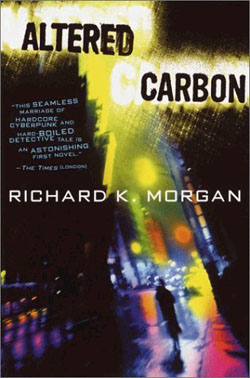
 |
Altered CarbonBringing Cyberpunk Back From the Dead |
Title: Altered Carbon
Author: Richard K. Morgan
Publisher: Del Rey
Vital Stats: © 2003; trade paperback, 375 pp.; US$14.95
ISBN: 0-345-45768-4
Freak Nation Rating: ![]()
![]()
![]()
![]()
Buy It From: Powell’s Books
The first time I read William Gibson’s Neuromancer, I fell desperately love with cyberpunk. The seamy paradigm of drugs, mercenaries and technology, the desperation of the poor and the depravity of the rich left me breathless, giddy with excitement and anticipation. After Gibson’s unheralded success, cyberpunk novels flooded into the field, some great — like G.A. Effinger’s When Gravity Fails — but many others unremarkable, formulaic copycats that felt dated the minute they came off the presses. Bad fiction choked the genre, turning it stagnant until it was eventually absorbed back into the general science fiction market. Like a death watch on a beloved family member, I was sad to see it die off, but also secretly a little relieved that the ordeal was over.
But even after it was gone, I never, ever stopped missing it.
All of this is a very long-winded, side-winding explanation for why Richard K. Morgan’s novel Altered Carbon left me giddy with glee. From the minute I cracked it open, it sucked me right back into a genre I thought was gone forever. Here were mercenaries hyped up on black-market drugs, virtual prostitutes, hotel-operating artificial intelligences, orbital conglomerates, and the whole sordid reality of a world where the rich make the rules and the rest of us try to get by however we can. But it wasn’t trite. It wasn’t copycat. It was good.
 The name of the book, Altered Carbon, refers to one of the principal concepts behind the book: the idea that by the 25th Century, mankind will have developed to the point where the core of a human being — the mind, the memories, experiences — are stored in a small cortical stack that can be transplanted between bodies, called sleeves, that are altered and tailored to fit the needs and desires of their owners. Death, real death, is rare because unless the brain stack is destroyed, it can always be downloaded into a new sleeve — assuming you can afford the price. Those who commit crimes end up stored virtually, their sleeves up for auction to the highest bidder.
The name of the book, Altered Carbon, refers to one of the principal concepts behind the book: the idea that by the 25th Century, mankind will have developed to the point where the core of a human being — the mind, the memories, experiences — are stored in a small cortical stack that can be transplanted between bodies, called sleeves, that are altered and tailored to fit the needs and desires of their owners. Death, real death, is rare because unless the brain stack is destroyed, it can always be downloaded into a new sleeve — assuming you can afford the price. Those who commit crimes end up stored virtually, their sleeves up for auction to the highest bidder.
Into this world comes Takeshi Kovacs, an ex-United Nations envoy, currently stored for various crimes against the state after his last contract ended in his death. Kovacs wakes up light years away from his home colony to find himself back on Earth, downloaded and re-sleeved into the custody of Laurens Bancroft, a wealthy Meth (short for Methuselah, someone with the means and money to have stayed alive for centuries, transplanting his brain into new cloned bodies as his old one degenerates). Bancroft is willing to give Kovacs a new start, a new sleeve, and a large expense account if Kovacs can unravel a mystery for him — Bancroft’s own murder.
According to the official police reports, Laurens Bancroft came home one night and shot himself. According to Bancroft, he would never have killed himself that ineffectively. Kovacs has six weeks to find out who, how, why, and what really happened, or go back into storage to serve out the rest of his sentence. The suspects range from inexplicably hostile police detective Kristin Ortega to Bancroft’s own wife Miriam, a decadent, bored socialite whose body has been tailored to emit sexual pharmaceuticals, and onward to Dmitri Kadmin, a.k.a. Dimi the Twin, a Russian assassin whose only trusted associate is his own clone — not to mention the scores of enemies Bancroft has accumulated over the centuries. Kovacs has his work cut out for him not only to find the killer but also just to stay alive.
Morgan’s plot is fast-paced, a futuristic thriller verging on noir, with well-fleshed out characters who operate with conflicting motives and unexpectedly shifting alliances. His descriptions are intricately lush; it’s easy to close your eyes and imagine the world he builds around you. Moreover, Morgan wields his future-tech with confidence, giving the reader enough detail to make it seem viable without breaking the author-reader pact of suspended disbelief.
Altered Carbon is amazing, intelligent and well-written. If you’re a science fiction fan, you’ll be drawn in by the richness of Morgan’s plot and descriptions. And if you’re like a cyberpunk fan like me, it’s proof that every so often, you can put on your mirrorshades and go home again.
Emily Crow has been in love with cyberpunk since she first plotted the downfall of the megacorps from her role in the shadows as a tabloid editor in an early ’90s LARP called The Zone. Although she does occasionally resent cyberpunk's habit of leaving the toilet seat up, she wouldn't kick it out for eating crackers in bed.